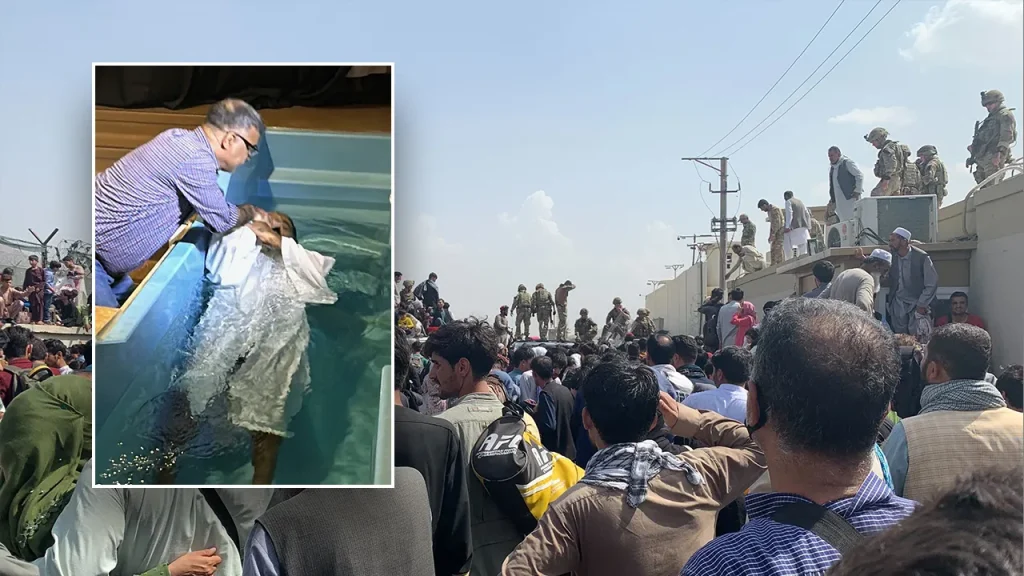The potential deportation of Afghan Christian refugees has sparked significant concern among faith leaders and human rights advocates as U.S. immigration policies shift under the current administration. With the Department of Homeland Security’s recent decision to end Temporary Protected Status (TPS) for Afghan nationals, there are fears of severe ramifications for Christians associated with this group. Pastor Behnam Rasooli, leading a congregation of Afghan Christians in Oklahoma City, has made urgent appeals for protection, recounting harrowing stories of persecution that await if these individuals are sent back to their homeland under Taliban rule.
| Article Subheadings |
|---|
| 1) The End of Temporary Protected Status |
| 2) Life Under Taliban Rule for Afghan Christians |
| 3) Advocacy from Faith Leaders |
| 4) The U.S. Government’s Position |
| 5) Responses from the Afghan Community |
The End of Temporary Protected Status
The Department of Homeland Security (DHS) has officially ended Temporary Protected Status (TPS) for Afghan nationals, which had previously granted safe harbor to individuals fleeing violence and instability since the Taliban regained control in 2021. This decision affects nearly 9,000 Afghan nationals, putting them at risk of deportation back to a country characterized by ongoing conflict and human rights violations. The TPS was initially created to protect individuals from countries experiencing extraordinary conditions that prevent them from returning safely. The termination of TPS is set to take effect on May 20, with the program formally concluding by July 12, as stated by officials.
Life Under Taliban Rule for Afghan Christians
Life for Christians in Afghanistan has become increasingly perilous under the Taliban regime. Individuals who have converted to Christianity often face brutal persecution, including imprisonment, torture, and even death. This is especially pronounced for Afghan Christians who may have been affiliated with Western institutions or foreign entities, making them prime targets for the Taliban. Reports have indicated that those who identify as Christians risk not only their lives but also their families, as the Taliban enforces laws that make practicing Christianity illegal. Pastor Ben has articulated that many Afghan Christians have legitimate reasons to fear for their lives should they be returned to their homeland.
Advocacy from Faith Leaders
Faith leaders and human rights activists have rallied to advocate for the rights of Afghan Christians. Pastor Behnam Rasooli, known as Pastor Ben, has been vocal in raising awareness about the threats faced by his congregation and other Afghan Christians. In interviews, he emphasizes the dire consequences they would face if deported back to Afghanistan. “If any of these Afghan Christians are deported back to Afghanistan, the first thing that will happen is the husbands will be killed, the wives will be taken as sex slaves,” he stated. Such harrowing testimonies are gaining traction, prompting calls for the government to reconsider the termination of TPS and extend protections for Afghans facing persecution.
The U.S. Government’s Position
DHS Secretary Kristi Noem has defended the decision to terminate TPS, citing an “improved security situation” in Afghanistan and a stabilizing economy as reasons for the policy change. “This administration is returning TPS to its original, temporary intent,” Noem stated. However, many oppose this viewpoint, highlighting the ongoing danger that Christians and other minorities face under the Taliban. The government maintains that individuals who feel threatened can apply for asylum on a case-by-case basis, but many fear that this process is insufficient to protect those with documented persecution claims.
Responses from the Afghan Community
The Afghan community in the U.S. is deeply concerned about the implications of ending TPS. Pastor Ben describes the arduous journeys faced by many Afghan refugees seeking asylum in the U.S., recounting a particular case of a family that traveled from Brazil, faced immense hardships, and waited months in a Mexican church sanctuary before making it across the border legally. Many in his congregation are afraid of being uprooted again and forced to return to the dangers of a Taliban-led Afghanistan. Aboriginal community advocacy groups, such as Help The Persecuted, are calling for Afghan Christians to be recognized as a “Country of Particular Concern” to allow for TPS while their asylum claims are processed. Without this designation, many fear they will face immediate deportation.
| No. | Key Points |
|---|---|
| 1 | TPS has been terminated for nearly 9,000 Afghan nationals, placing them at risk of deportation. |
| 2 | Christians in Afghanistan face severe persecution under Taliban rule, including death and imprisonment. |
| 3 | Faith leaders like Pastor Ben are advocating for the protection of Afghan Christians in the U.S. |
| 4 | The U.S. government defends its position on ending TPS, claiming improved conditions in Afghanistan. |
| 5 | Community advocacy groups are calling for TPS to be reinstated for Afghan Christians facing persecution. |
Summary
The termination of Temporary Protected Status for Afghan nationals poses a grave danger to thousands of individuals, particularly Christians, who are facing severe persecution under Taliban rule. As faith leaders and advocates call for renewed protections and compassionate immigration policies, the urgent need for action to safeguard the lives and rights of these vulnerable individuals remains evident. Community support and advocacy will play a crucial role in ensuring their voices are heard in this critical crisis.
Frequently Asked Questions
Question: What is Temporary Protected Status (TPS)?
TPS is a humanitarian program that allows individuals from countries experiencing severe conflicts or disasters to live and work in the U.S. without fear of deportation.
Question: What specific dangers do Afghan Christians face under Taliban rule?
Afghan Christians face threats of imprisonment, torture, and execution simply for practicing their faith, as the Taliban enforces strict laws against Christianity.
Question: How can Afghan nationals seek protection if TPS is terminated?
Afghan nationals can apply for asylum on a case-by-case basis, although many fear this process may not adequately address their urgent safety concerns.
